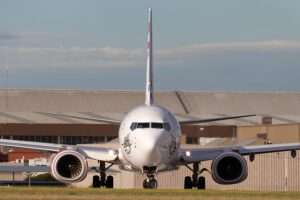Virgin Australia and Boeing release SAF report

The report, completed by independent advisory firm, Pollination and unveiled at an industry event in partnership with the University of NSW’s Decarbonisation Innovation Hub, examines the challenges inherent in the current policy frameworks and the critical points of consideration to unlock alternative SAF accounting frameworks, such as book and claim.
The system separates the environmental benefits of SAF from the physical fuel. This allows airlines to purchase and claim the environmental benefits of SAF without physically transporting and storing the fuel, reducing the logistics costs and avoiding the additional unnecessary carbon emissions.
Book and claim represents a significant opportunity for Australia, which has natural advantages for SAF production, including abundant feedstock resources.
With this system, Australia could become an exporter of environmental benefits to regions where SAF production is limited or unavailable, creating economic opportunities by aggregating demand from both domestic and international markets, while supporting global aviation decarbonisation.
Australia’s current greenhouse gas (GHG) accounting system allows airlines to recognise emissions reductions from direct combustion of SAF, but lacks mechanisms to account for SAF that Australian airlines purchase that is used outside the country.
Virgin Australia general manager sustainability Fiona Walmsley said: “In partnership with Boeing and the NSW Powerfuels including Hydrogen Network, we’re thrilled to bring together industry and academic leaders to present and explore the latest research supporting aviation’s transition to net zero emissions by 2050.”












